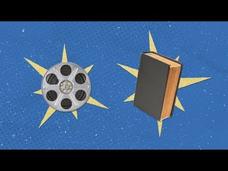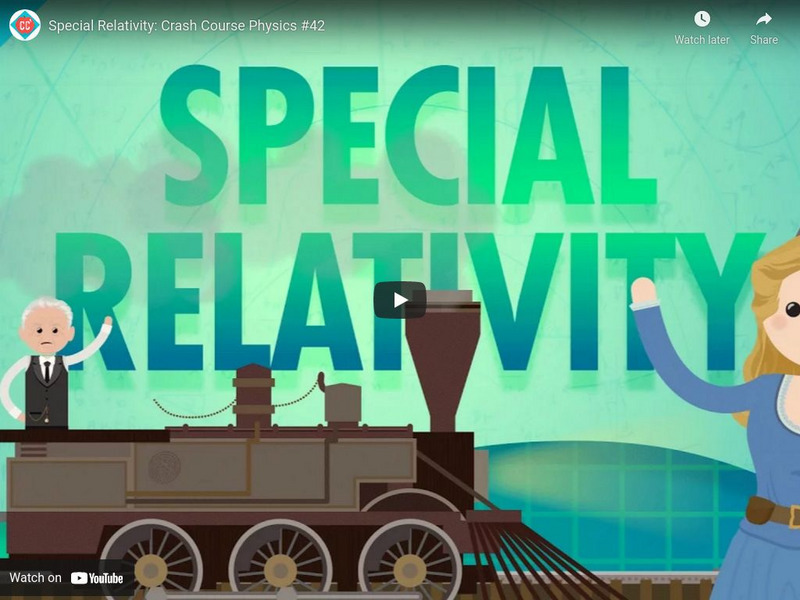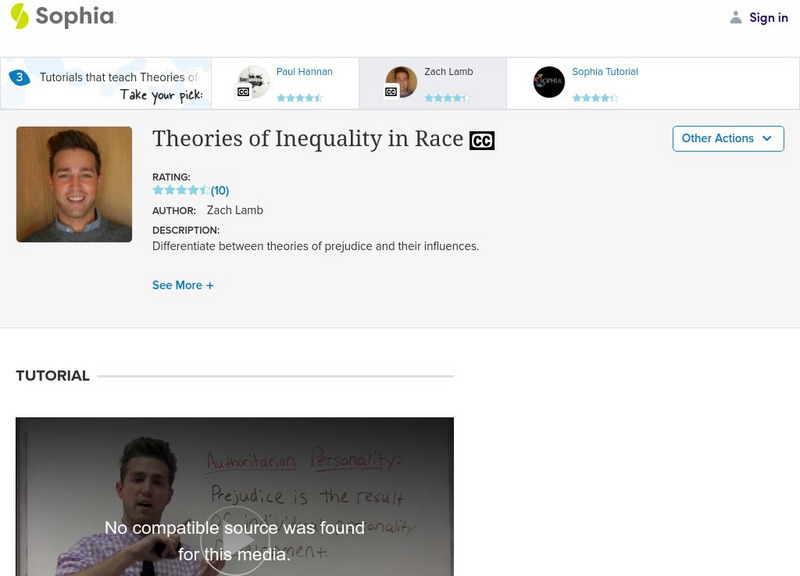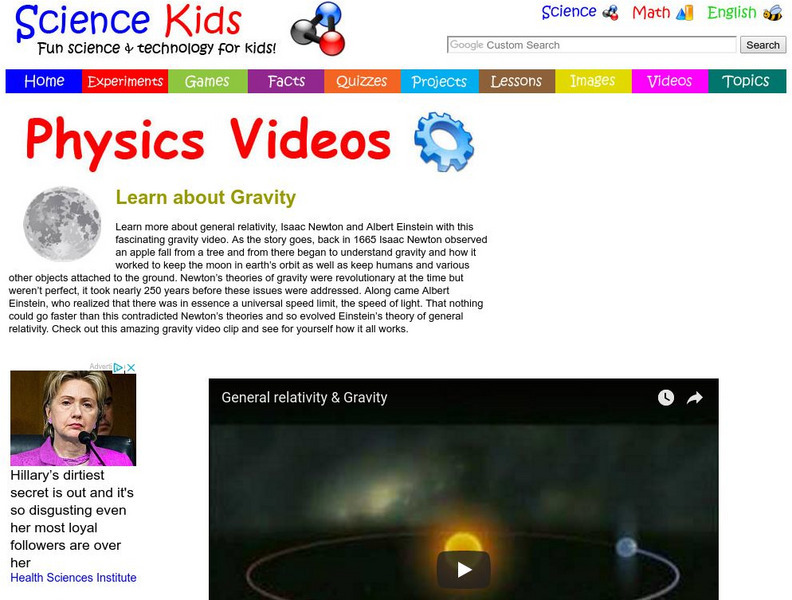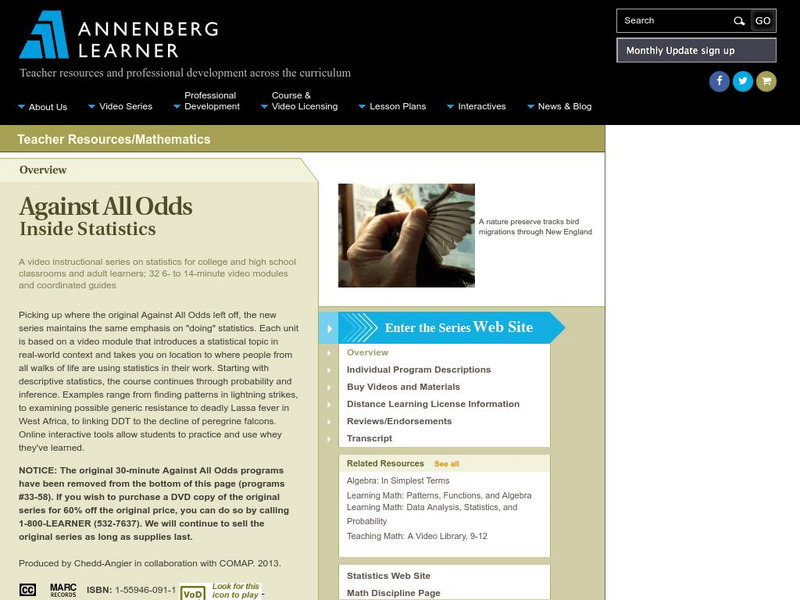Be Smart
Why Do You Love Your Family?
Is that warm, fuzzy family feeling a product of evolution? Explore altruism through a video from an engaging science series. The narrator discusses parental instincts, evolutionary fitness, and an organism's drive to ensure it passes its...
PBS
When the Book is Better than the Movie
Sometimes the book is better than the movie; other times, the movie comes out on top. A video discusses the topic of novels and their film adaptations, pointing out specific texts and how the tale translated to the big screen. The...
MinutePhysics
How to Break the Speed of Light
Have you ever wanted to break the speed of light from your backyard? Something seemingly impossible, and technically improbable, looks impressive thanks to the "magic" of science. The brief video explains how photons can travel from your...
PBS
Pbs Learning Media: Motion and Relativity
This video from the American Museum of Natural History illustrates how motion is described relative to a frame of reference, and how Einstein's special theory of relativity is needed to describe the motion of objects traveling near the...
PBS
Pbs Learning Media: Einstein's Special Theory of Relativity
What happens when you approach the speed of light? This video segment adapted from NOVA follows one of Albert Einstein's thought experiments and his quest to find the answer. [7:05]
Khan Academy
Khan Academy: Relating Social Theories to Medicine
The resource from Khan Academy and the Association of American Medical Colleges provides study content for the MCAT. This resource shows how social theories are related to medicine.
Crash Course
Crash Course Physics #42: Special Relativity
So we've all heard of relativity, right? But, what is relativity? And how does it relate to light? And motion? In this video episode of Crash Course Physics, Shini talks to us about perspective, observation, and how relativity is REALLY...
Sophia Learning
Sophia: In Groups, Out Groups, and Social Identity Theory: Lesson 3
At the end of this tutorial, the learner will understand how adherence to group norms establishes in- and out- groups and will be able to relate this to Social Identity Theory. It is 3 of 3 in the series titled "In-Groups, Out-Groups,...
Khan Academy
Khan Academy: Intro to Special Relativity and Minkowski Spacetime Diagrams
Let's see how we can start to solve problems by introducing Minkowski spacetime diagrams. [13:43]
Bozeman Science
Bozeman Science: Kinetic Theory & Temperature
In the following video Paul Andersen explains how the macroscopic measure of temperature can be related to the average kinetic energy of molecules in motion. The Boltzmann constant and distribution can be used to calculate the root mean...
Sophia Learning
Sophia: Social Movement Theories: Lesson 2
This lesson will discuss social movement theories. It is 2 of 3 in the series titled "Social Movement Theories."
Sophia Learning
Sophia: Social Movement Theories: Lesson 1
This lesson will discuss social movement theories. It is 1 of 3 in the series titled "Social Movement Theories."
Sophia Learning
Sophia: Theories of Inequality in Race: Lesson 4
This lesson will define, discuss, and explain the scapegoat theory, authoritarian personality theory, culture theory, and conflict theory. The key ideas and influence of each will be explained. It is 4 of 4 in the series titled "Theories...
Sophia Learning
Sophia: Theories of Inequality in Race: Lesson 3
This lesson will define, discuss, and explain the scapegoat theory, authoritarian personality theory, culture theory, and conflict theory. The key ideas and influence of each will be explained. It is 3 of 4 in the series titled "Theories...
Khan Academy
Khan Academy: Potential Ways to Detect an Ether Wind
Thinking about how Earth's relative velocity to hypothetical luminiferous ether can be used to detect ether.
Science for Kids
Science Kids: Physics Gravity: Learn About Gravity
Learn more about general relativity, Isaac Newton, and Albert Einstein with information about gravity. [8:31]
Khan Academy
Khan Academy: Angle of S' Axis in Minkowski Spacetime
Take a closer look to see if there is a relationship between relative angles of the axes in reference frames. [7:21]
PBS
Pbs Nova: Becoming Human, Part 1
"Where did we come from? What makes us human?" Becoming Human is a three-part comprehensive examination of the latest research on our hominid relatives. Part 1 takes a critical look at what set us on the path from ape to human. The...
PBS
Pbs Nova Online: Einstein's Big Idea
A many-faceted investigation into Albert Einstein. Includes, a Timeline, Light Stuff, Genius among Geniuses, Time Traveler, Relativity and the Cosmos, and much more. Also, Einstein Links and a Teacher's Guide are provided.
Khan Academy
Khan Academy: Fundamentals: Bayes' Theorem
In this Wireless Philosophy video, Ian Olasov (CUNY) introduces Bayes' Theorem of conditional probability and the related Base Rate Fallacy. [6:20]
NPR: National Public Radio
Npr Videos: Skunk Bear: How Eclipses Changed History
Newton and Einstein had big ideas but needed an eclipse to prove them. And scientists are still pursuing secrets of the universe one eclipse at a time. [6:09]
Annenberg Foundation
Annenberg Learner: Against All Odds: What Is Probability?
A video program on probability, covering relative frequency, randomness, sample space, and probability rules. Includes a discussion about statistician Persi Diaconis' work with probability theory. [29:06]
Sophia Learning
Sophia: Social Construction of Reality: Lesson 4
This lesson will discuss the Social Construction of Reality and how it relates to symbolic-interaction theory. It is 4 of 5 in the series titled "Social Construction of Reality."
Sophia Learning
Sophia: Social Construction of Reality: Lesson 5
This lesson will discuss the Social Construction of Reality and how it relates to symbolic-interaction theory. It is 5 of 5 in the series titled "Social Construction of Reality."
Other popular searches
- Science Theory of Relativity
- Special Theory of Relativity
- Theory of Relativity Ppt
- Theory of Relativity Video
- Theory of Relativity Pot



